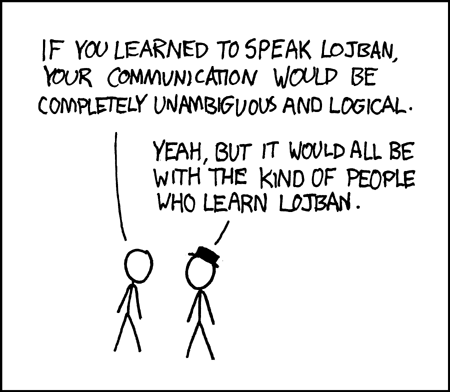s_allard wrote:This brings me to another point. In the midst of all this discussion about cases and to some extent gender, it is interesting to note that English has neither grammatical gender nor cases. Compared to all the languages mentioned here - except for Indonesian of which I know nothing but that I will put on my bucket list - English is the easiest language to learn despite its horrendous spelling. When you add a simple verb conjugation system, the absence of any regulatory bodies, tolerance of regional variation and openness toward spontaneous evolution, we have all the hallmarks of the dominant natural language for the forseeable future.
This is the problem. This widely spread myth. I have no clue, why are the English natives convinced so strongly about this, they you just find this arrogant stance acceptable. It is not based on truth. Tarvos is right with that joke. Many natives find their native language the easiest. But none but the English ones dare to push that opinion on the rest of the world.
What are the difficult aspects of English:
-the disparity between the written English and the spoken one due to the irregular ortograph. Really, I have never heard a German or Italian learner say they feel as if they were learning two langauges at once. It is a common impression among the English beginners.
-very irregular grammar, often requiring more memorisation than logic. The huge list of irregular verbs is without competition. Or the phrasal verbs. Yes, you can argue many are logical, but that is the point of view of the natives. For a learner required to actively use them, lots of them are just memorisation and an unnecessary complication, since they usually have an equivalent.
-the articles. Many languages don't have them. And from the point of view of a Czech native, they look absolutely unnecessary and redundant, and the argument "but you would be understood without them too" is very common. It is always about the point of view. Learning the articles is hard for many learners.
-Several past tenses. And combining them.
-The word order. It is extremely rigid and requires a lot of training to get used to. Many learners find it hard.
And I could continue. You could actually talk about a large part of this list the same was as about the cases or some of the French spelling rules. Claiming that English is the easiest language to learn and using it all the time as the model the others should follow, instead of insisiting on the continuity with their tradition, that is very narrow minded. It is an extremely priviledged opinion.
And this attitude is spread really widely in the whole ESL industry, and works as yet another weapon in the competition against other languages. It is so sad to see first time learners struggling and putting lots of money into English just because "French/German is harder". This myth plays a major part in their decision what to put money into. Many of them could have learnt French or German faster and cheaper (and have more use for it in the end), but this PR element convinced them otherwise.
